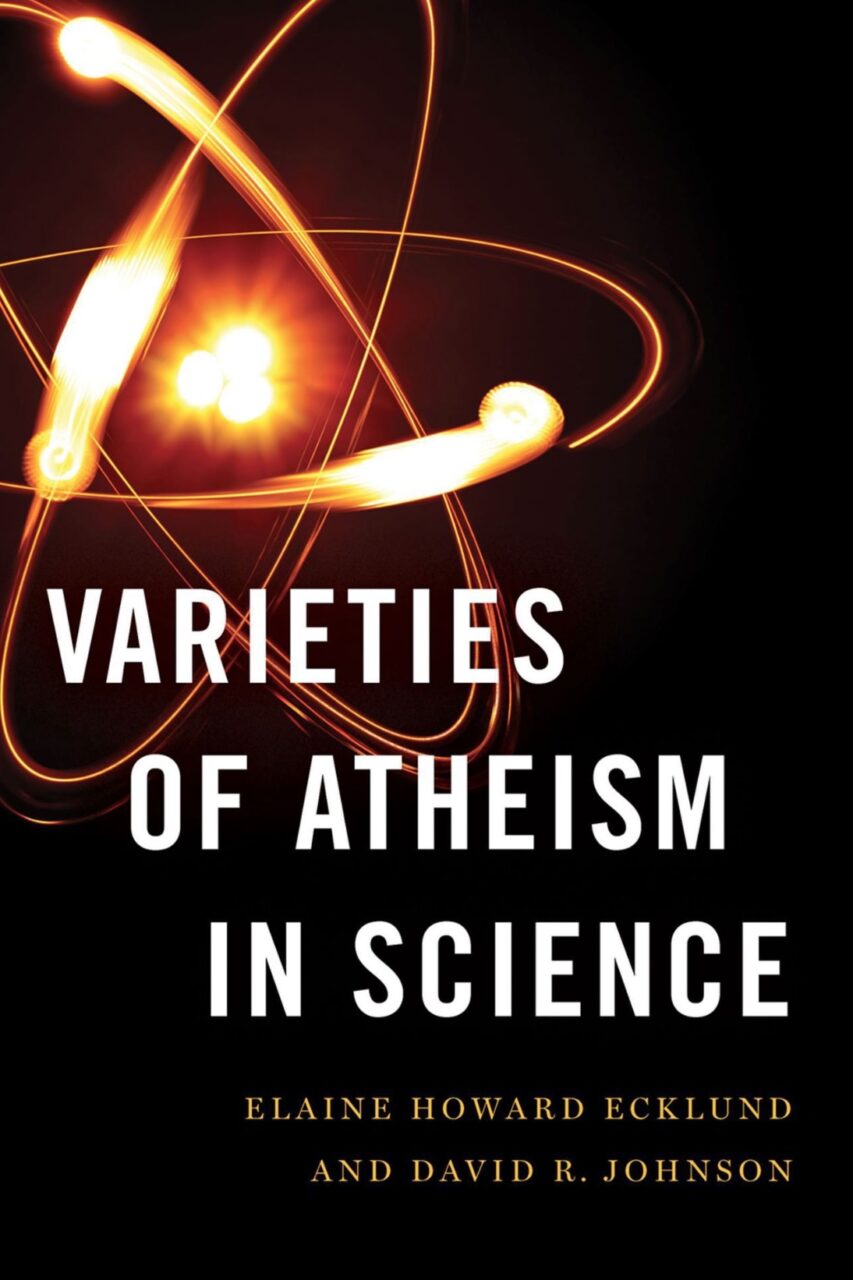Book Review by Charles Sherlock
Varieties of Atheism in Science
By Elaine Howard Ecklund and David R. Johnson
Oxford: Oxford University Press, 2021; viii + 216 pages
ISBN 9780197539163, 1st edition, hardcover
AUD$43
That this book was published by Oxford University Press says a good deal about its significance. The authors—a sociologist and an educator, both based in the USA—surveyed over 22,000 scientists in physics and biology across the USA and UK about their understanding of science and religion, and then held follow-up interviews with hundreds of respondents. Their findings are documented in this volume, which is intended for anyone interested in faith–science relationships.
Varieties is elegantly organised, uses quotations effectively, and is sensitive to issues of gender and cultural diversity (see the table on p. 34). Care is taken with the different national contexts (USA or UK) in which science is undertaken. In the UK, where the Church of England (oddly named “Anglican”) is established, church attendance may be lessening, but engagement between the academy and religion is of long standing, and (as one of the US authors notes of the UK) “scientists here, although less religious on the whole, are just plain friendlier and easier to talk to” (p. 154). In the USA, church and state may formally be separate, but religion permeates society, and “the conflict narrative is much more pronounced in the public sphere” (p. 155) and among evangelical Christians (pp. 144–5).
The opening chapter asks, “Why Study Atheism among Scientists?” Both the “scientism” that breeds hostility to religion, and growing public suspicion of science (e.g., due to technology leading to climate change) are of concern for the common good—and for science. Richard Dawkins’ books were often mentioned in the interviews, but many viewed his hostility to religion as counterproductive. Further, the study shows that atheist scientists are not all alike: there is a spectrum of “conflict to complementary” relations between science and religion.
I suggest that readers turn next to the Appendix: Studying Atheist Scientists. Despite the small type, its dozen pages give helpful details not only on the study’s exemplary statistical methodology, but on what the project is about.
Chapter Two explores why many scientists are atheistic in outlook. Although science plays a key part in atheists’ worldviews, the research finds that it is not its direct—in classical terms, its material or efficient—cause. Over half those surveyed (in both the UK and USA) grew up in atheist households, predisposing them to hold an atheist worldview. This reflects cultural shifts in the West over recent decades. For those with church links in their youth, bad experiences with religion (whether from people, structures, or beliefs) and inability to explain evil or suffering were major factors in adopting atheism. In the USA, college was a key time for many moving away from religion as they left their family.
Chapters Three, Four, and Five cover the three main types of atheist scientists found in the study. “Modernists” (66% USA, 73% UK) reject all religion or spirituality; the New Atheism is a significant factor here. “Culturally Atheist Scientists” (28% USA, 21% UK) continue to associate with some religious practices. A case study of Jews is interesting here: many who are not believers nevertheless participate in culturally significant events. “Spiritual Atheist Scientists” (6%) may use meditation in their work or find wonder in science. These chapters include a multitude of intriguing insights: how do attitudes to marriage interact with the varieties of atheism, for example?
Chapter Six, entitled “What Atheist Scientists Think about Science,” I found of most interest (it is also the longest). All those surveyed agreed that “scientific method” and curiosity are central. But the questions, “Are there limits to science—and should there be?” and “What wider community relationships matter?” were not furnished with answers. The project detected “scientism” in about a third of the “modernists.” For most, this is an often-harsh worldview. For others it includes a humility about what can be known with certainty. This chapter made me more aware of how my assumptions about life (health, gender, experience, age, worldview …) as well as my academic discipline(s), affect what I think “science” is and involves. It would make a great basis for conversation.
Chapter Seven outlines how the three “varieties” (and their subsets) see meaning in life. Some respondents are quite nihilistic. I’d want to ask them, how long is it since you have been at an art gallery / rock concert / picnic / nursing home / forest walk …? Some respondents do not find science “emotionally satisfying” and seek meaning elsewhere: David Hume is cited to illustrate the tendency to “compartmentalise” life into science, household, and community life, and other cupboards. Several scientists find meaning in the way their work helps others, spurring “progress” in the human community, or by “making a mark.” In the USA, the report notes, atheists are commonly assumed to be immoral, but just half a dozen pages are given to morality. Given the scientific method, “empathy” and “equality” are found to undergird the ethics of some atheist scientists.
The authors identify as religious, presumably Christian given their US base. However, the only theological work in the extensive bibliography is Christian Theology by Millard Erikson, a mainstream evangelical textbook—with its author referred to as Erikson Millard! This meagre reference would seem to indicate that the authors’ theological background is minimal, but also that there is need for theological exploration of what “atheism” means for many today.
A short concluding chapter, “From Rhetoric to Reality,” takes the research outcomes towards action. Its main message is that space is needed “where atheist scientists and religious believers can find their own connections” (p. 149, emphasis added; this does not mean more conferences!). The final heading is, “Why We Should Care” (p. 150). The answer given is: for the well-being of science, religion—and the common good.
An Index concludes this significant publication, which I have no hesitation in commending to interested readers.

